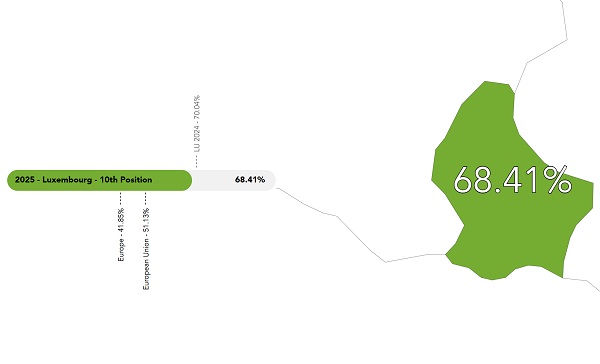 Credit: ILGA-Europe Rainbow Map 2025
Credit: ILGA-Europe Rainbow Map 2025
ILGA-Europe recently published its annual Rainbow Map and Index ranking European countries according to their legal and policy practices for LGBTIQ+ people; Luxembourg dropped from 7th place in 2024 (and 2023) to 10th place in 2025.
Over one year, Luxembourg's total score decreased from 70.04% to 68.41%. It currently ranks 10th out of 49 countries analysed.
Regarding areas of improvement, ILGA-Europe recommended (once again) that Luxembourg: allow for automatic co-parent recognition for all couples; ban medical interventions on intersex minors (children) before they are able to give their informed consent.
As reported by Luxembourg's Ministry of Gender Equality and Diversity, Minister Yuriko Backes commented: "Although we have fallen three places compared to last year, my ministry and I remain committed, as set out in the government's programme, to ensuring respect for and defence of the freedoms and rights of all people in all their diversity."
The ministry recalled that it had organised, in March 2025, the first LGBTIQ+ symposium to consult representatives of civil society organisations, stakeholders from ministries and other public administrations and institutions to discuss the potential challenges facing people belonging to LGBTIQ+ communities in Luxembourg. Miltos Pavlou, an expert from the EU Agency for Fundamental Rights, also participated in this consultation to emphasise the importance of progress still needed towards de jure and de facto equality in this area.
The results of the fourteen thematic workshops organised during the symposium will largely be incorporated into the revised version of the national LGBTIQ+ action plan, which will be presented to the government and the Chamber of Deputies (parliament) in July 2025.
The ministry added that the implementation of this action plan will be monitored by the LGBTIQ+ committee, representing all ministries and bringing together all LGBTIQ+ organisations and human rights advisory bodies in the format of an expanded committee.
Noting the results of the mapping and the general situation of LGBTIQ+ people in Europe, Minister Backes expressed her concerns: "We are currently witnessing a situation where, internationally, rights that many of us took for granted are being actively challenged by anti-democratic forces. These movements want us to believe that demanding equality means asking for special treatment. This is not the case. These are fundamental human rights that, by their very nature, are universal. It is not about creating new rights, but about guaranteeing the same rights for everyone". She added: "We remain determined and are intensifying our efforts, both nationally and internationally".
The ILGA Index consists of various indicators, namely: equality and non-discrimination; family; hate crime and hate speech; legal gender recognition; intersex bodily integrity; civil society space; asylum.
Luxembourg's profile can be viewed at the following link: https://rainbowmap.ilga-europe.org/countries/luxembourg/.
More globally, the United Kingdom dropped six places in ILGA-Europe's 2025 Rainbox Map. Hungary and Georgia also fell significantly following anti-LGBTIQ+ legislation. Katrin Hugendubel, Advocacy Director at ILGA-Europe, said: "Moves in the UK, Hungary, Georgia and beyond signal not just isolated regressions, but a coordinated global backlash aimed at erasing LGBTI rights, cynically framed as the defence of tradition or public stability, but in reality designed to entrench discrimination and suppress dissent".
Malta has retained its top spot for the past ten years. Belgium jumped to second place, with 85 points, after positive policy changes, and was followed by Iceland in third place, with 84 points.








